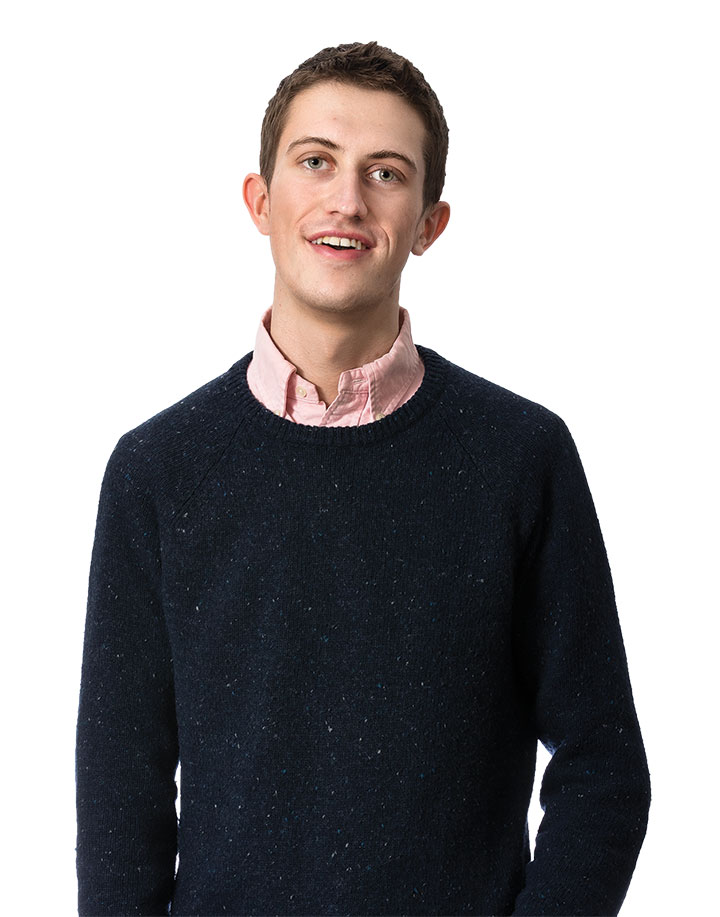Q&A: John “Newby” Parton ’18 on his Appalachian Roots
Pyne Prize winner reflects on journey from a Tennessee town to Princeton
John “Newby” Parton ’18, a Woodrow Wilson School concentrator selected for the Scholars in the Nation’s Service Initiative, is a co-winner of the Pyne Prize this year along with Maggie Pecsok ’18 of Virginia Beach, Va. (see the March 21 issue of PAW). A native of McMinnville, Tenn., Parton talked with PAW about his journey from Appalachia to Princeton.
How was growing up in McMinnville?
It’s small — about 13,000 people. Only about 12 percent of adults in my hometown have bachelor’s degrees, and I am very fortunate that my mom is among that 12 percent. I grew up mostly with my mom, who worked as a high school French teacher. She was also my Sunday School teacher, and my grandfather was a preacher at my church, so church was very important to our family. I have an older brother and two younger brothers.
In addition to working full time as a teacher, my mom would have one or two part-time jobs at a time. My mom and my dad were separated, and my dad made even less money than her — he’s a factory worker at Federal-Mogul Motorparts.
How do people in McMinnville perceive Princeton? And how do people at Princeton perceive your hometown?
They don’t perceive Princeton — it’s not on their radar at all. When I told a lot of my friends that I was going to Princeton, they would ask me two questions: “Where’s that?” and “Did you not get into Vanderbilt?” Because Vanderbilt is seen as sort of the pinnacle of what you can achieve academically.
And I don’t think people here perceive McMinnville, either. When people think of Tennessee, they think of cities — the liberal islands in the sea of red that is Tennessee. There are very few students here who come from an area like that and who understand and can empathize with the people who are there.
Do your classmates want to understand the place where you grew up?
I’m not so sure they do. People who have been particularly close to me have taken that initiative, but I think for the most part people believe that their beliefs are right — they believe they have the “right” worldview, and don’t want me to explain why President Trump is President Trump.
I think culturally, even though people in Tennessee are less accepting than people up here are of certain minority groups, they’re friendlier in general and more ready to talk to you or to help out a neighbor. It’s a really good culture, and I think that empathy is expressed in a different way than it is in the city.
What’s your take on how Appalachia is portrayed in the media?
In some media, maybe there’s an outlook that Appalachia is a little bit backward, or that there’s some animosity toward the people there. And to that I would say that this is a very low-income area — I really consider Appalachia an underprivileged community, just like I would consider an inner city. Obviously the kinds of struggles and the exact forms of discrimination in those two places are wildly dissimilar. But there’s a lot to be said about a need to tackle rural poverty, and I don’t think either political party is doing it right now.
So when President Trump says, “We’re going to build a wall so that people from Mexico can’t take your jobs,” I think that speaks to my dad a lot — he was laid off in the recession because his job moved to Mexico. I’m very pro-globalization and free trade, but I recognize that it has not been a good thing for my dad and that the benefits of it have not been redistributed. So I totally understand why people from my hometown have the beliefs that they do.
Your senior thesis looks at the recusal of judges from cases in which they have potential conflicts of interest. How did you get interested in this?
Last year I took an investigative journalism course with Professor Joe Stephens, and he did this kind of work in the ’90s — checking judges’ financial-disclosure reports and looking for potential conflicts of interest. I thought this was important work.
A friend made a computer program that would compare the names of cases to the judges’ financial-disclosure reports and tell me when there was a match, so I was able to automate the process. For the journalism class I did three states: New York, California, and New Jersey. For my thesis I’m expanding it to the 1,000 or so judges who were serving in the U.S. between 2009 and 2012.
What did you find?
When I did the pilot project last year, I found that about a dozen out of about 140 judges had conflicts of interest where they were legally required to recuse themselves but didn’t. Including those, 25 had some conflict where their impartiality could reasonably have been questioned.
What are your career aspirations?
I want to go into a career in civil-rights law. I probably want to focus on the criminal-justice system in particular because I think it is deeply unjust in too many important ways. And if the cards fall in the right places, I would be open to accepting a judgeship if I were appointed to one.
Interview conducted and condensed by A.W.












No responses yet